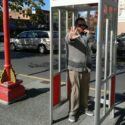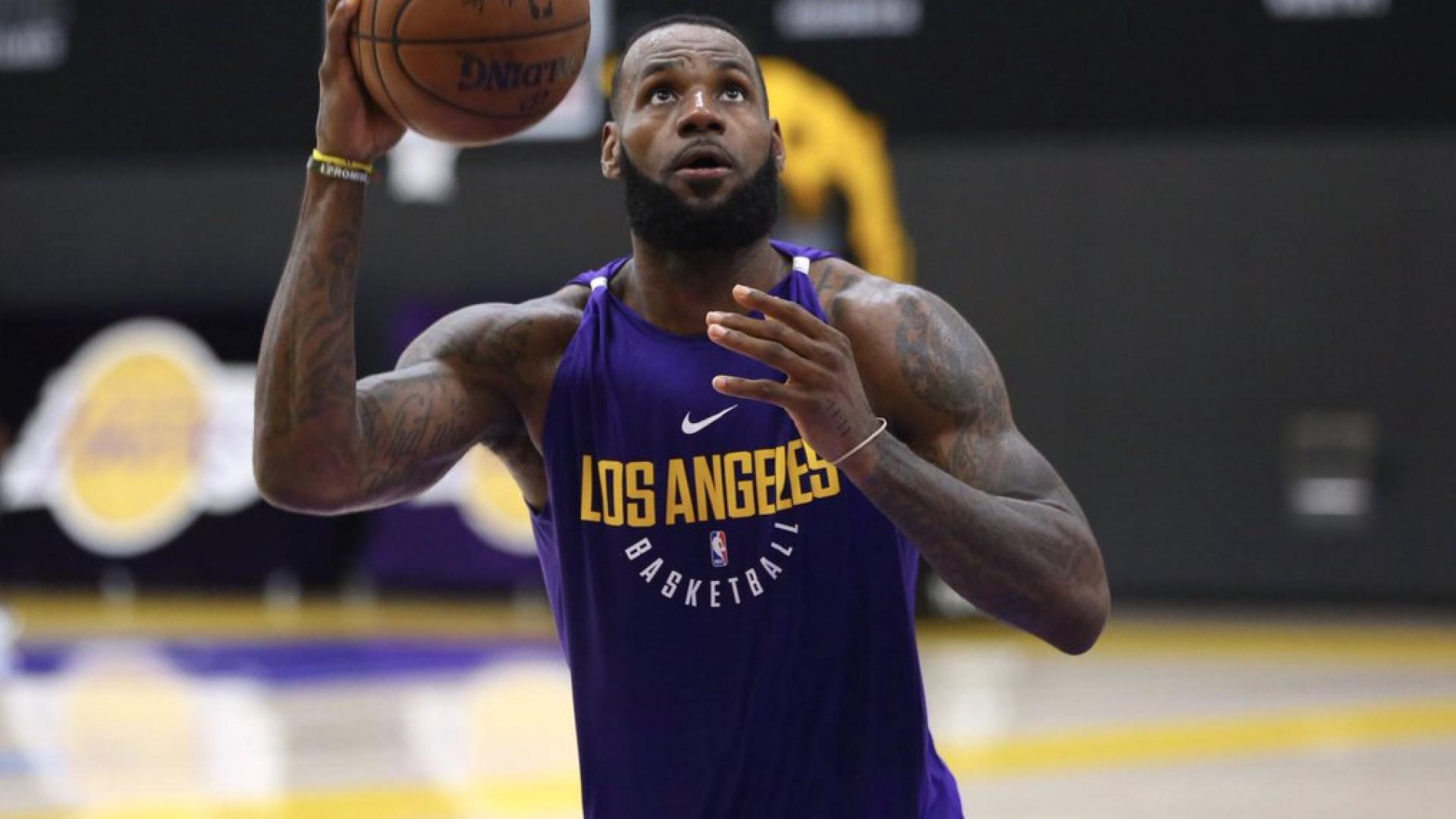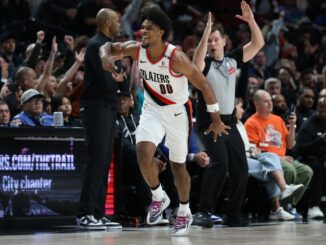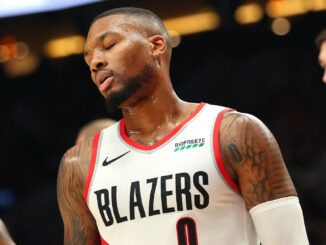
ESPN’s “The Last Dance” documentary premiered this past Sunday evening, and with it came some old wounds reopening in Rip City. At the top of the questions buried in the time capsule – why didn’t Portland draft Michael Jordan? For those of you too young to know the name Sam Bowie, well, you’re going to hear that name a lot this week. And while you might think this was an isolated incident, this was not Portland’s first time drafting a bust at center right in front of a future Hall of Fame player—in fac,t it was just the second of at least three occasions.
But this is not an exploration into Portland’s sordid history with drafting centers. We’re not here to pour salt in old wounds; these folks are plenty salty enough so put yours away. Below we will explore the high profile transactions the team made starting with the 1984 draft, and leading up to their meeting with Michael Jordan’s Chicago Bulls in the 1992 NBA Finals.
Given that the team made two Finals appearances in the 8 years following Bowie’s arrival, did the drafting of Bowie really lead them down the wrong path? Or was this team as good as any other they could have assembled if they had nailed the 1984 and subsequent drafts? We will explore that and more in the questions that follow. Contributors are Matt Conrad (MC) Bryant Knox (BK), Casey Mabbott (CM), and Kevin Randall (KR).
1. Portland famously passed on the opportunity to pair Michael Jordan with Clyde Drexler, and focused on drafting a center in Sam Bowie. Do you think the team’s logic of needing a complete lineup made sense, or should they have drafted talent over need?
MC: I think what is often overlooked in the debate of ‘talent over need’ is that Sam Bowie was quite a talented player and a worthy 2nd pick to a team in desperate need of a big. He was no Hakeem (then Akeem), but he was (essentially, due to missing one full season) a 4-year star player at Kentucky and a 2-time All-American. With the exception of his missed season, he was durable and a significant force on both ends of the floor, and even looked great vs. Ewing in the ‘84 Final Four. The passage of time has shaped the narrative of ‘Jordan over Bowie’ and the injuries that decimated his career did not help at all, but when you recall that the best defender on the squad that previous year was probably Paul Verhoeven (who?!) and the best rebounder was Mychal Thompson (not even in the league top 15), then you can see why Bowie was really a no-brainer at the time.
BK: The debate of fit vs. talent isn’t always obvious when the player you’re hoping fits is also supremely talented. But the Blazers were overthinking this one to the point that Bobby Knight—yes, the Bobby Knight—had to be the voice of reason. After coaching Jordan in the 1984 Olympics, Knight called then-Portland general manager Stu Inman with advice on the draft. When Inman responded that the team needed a center, Knight told him to draft Jordan…and play him at center. Basketball may not be that positionless, but it lends itself to a positionless flow maybe better than any other game among the pros. Rip City would have been way ahead of its time, but the idea of Jordan and Clyde both gliding out West will make you forget fit was ever in question.
CM: The rule is you draft the best player regardless of need. You can’t simply refuse to draft Jordan because Clyde is already on the team (and not a starter yet, he played sparingly his rookie year), if that’s the case you don’t draft Clyde in 1983 when you had established all-stars Jim Paxson and Kiki Vandeweghe already taking the two spots Clyde would have needed to take over. Portland wanted a big and ignored the other options, and that’s fine but that doesn’t give them a pass. Dress this up however you like, they messed up and took the wrong guy (although he did mislead them). Even if you don’t get Jordan or Hakeem, Charles Barkely was also in this draft.
KR: I think the pick made sense at the time. It was a center that led Portland to a championship in 1977, and in that era you needed a big man to be a contender. With a star shooting guard on the roster it made more sense to get that elusive center that the Blazers had been looking for since Walton left.
2. Buck Williams arrived in 1989 as a result of a trade that sent Bowie to New Jersey and immediately turned Portland into a title contender, reaching the conference finals three consecutive years, advancing to the Finals twice. Does Buck’s arrival and the highs the team reached put you at ease with missing out on Jordan in Portland? If your answer is no, would a title in either of those years have sealed it for you?
MC: It’s funny, because one of the things that I carry with me as a Trailblazers super-fan, is my ‘badge of shame’, as you take it, and always being able to talk about the Bowie vs Jordan debate and the ‘one that got away’. It made that Finals with Clyde and Mike that much more fun to watch, and made me a little bit extra of a Jordan fan growing up, rather than hating him like a villain – because he was almost a Blazer! So questions like this are hard to answer for me, because I really enjoyed Buck on the squad and it’s hard to imagine those deep playoff runs without him – and I really enjoyed Mike’s title runs and Bulls teams…because I carried that ‘badge of shame’ as a Trailblazers fan. So, ultimately I do not need to be put “at ease” with the Bowie pick.
BK: I respect the glass-half-full view of Sam Bowie’s grand purpose in Portland. But I wouldn’t go as far as to say trading in a busted Chevy for a sturdy Ford makes me forget passing on the Ram. Ultimately, I think winning a title with Buck would have helped if it had come over Jordan himself. If “The Shrug” never enters the NBA lexicon, maybe I can get over the Bulls winning their titles. But while this isn’t to discredit Buck and Cliff—they were both Blazers legends in their own rights—neither was the one that got away.
CM: Buck’s arrival made a lot of things better, and I don’t think going 5-12 against three of the greatest dynasties in NBA history (Pistons, Lakers, and Bulls) is reason enough to forget all the great moments the late eighties/early nineties Trail Blazers brought their fans. I’m glad Buck played here and while he didn’t make me forget about losing out on Jordan, I’m also not going to forget being happy with the team and the great memories we did get from them. I watched a lot of fun games on a UHF channel paired with the call on 1190 KEX in the early 1990s (not all of us could afford going to games or Blazer Cable) and I wouldn’t trade those memories for a roster supposedly richer in talent with zero guarantees they get any farther than they did.
KR: Yes, I think it shows that not picking Jordan and filling out the roster was the right call. In Buck’s best season with the Blazers (1989) he averaged 13.6 points and 9.8 rebounds – which are decent numbers. But if Bowie had been able to stay healthy and reach his potential he would have been a superior player. Had Bowie stayed healthy there is no question in my mind we would have another banner or two in the rafters.
3. Kevin Duckworth was acquired via trade in 1986, became a full time starter in 1987, and was an all-star by 1989. Are you more interested in Duckworth and his actual accomplishments vs what Bowie could have done if he had been healthy?
MC: I seriously doubt we would have traded Walter Barry for Duckworth, a guy we essentially were bringing in and tagging to be Steve Johnson’s backup, if we had rolled into the season with a healthy Bowie. As contemporary Blazers fans are all-too-familiar with, those broken legs are at best a 12-month heal job – and you need Centers. In a vacuum, that trade benefitted Portland immensely, as Duckworth was way better for the franchise long-term that Barry would have been, and coupled with Duck’s work ethic and ability to stay healthy (and actually get along with teammates) proved to be in the end, the reasons it is of the best trades ever in franchise history. But ultimately yes, a healthy Bowie and a phenom Barry is an interesting ‘what if’…
BK: I grew up down the street from Kevin Duckworth’s house. I practically played Little League in his front yard. But as much as I daydreamed about what the inside of the crib looked like, Bowie and the what-ifs have occupied far more of this fan’s brainspace throughout the years. Respect to what Duck accomplished, but the unknown will always be more interesting.
CM: Much more interested in what Duckworth did on the court than what Bowie might have done. Duck was no slouch, he was a two time all-star and a force in the paint. While it would have been great to see what a fully healthy Bowie could accomplish, this wasn’t the first time the team had to pivot (industry humor) after a botched draft. Duckworth was the people’s champion, wore double zero and made it look good – he was the hero we needed.
KR: I love Duckworth. But I wouldn’t be a Blazers fan if I didn’t spend countless hours daydreaming on the “what ifs” of having a healthy center. Oh what a wondrous time it would have been.
4. Cliff Robinson was drafted in 1989 and became a fan favorite and contributor to the 1990 and 1992 Finals teams. But that same draft could have landed Shawn Kemp in Portland if they don’t send the pick to the Nets for Buck. If you had to pick, would you rather have Buck and Uncle Cliff? Or add Kemp to the lineup?
MC: Since we are playing armchair GM today, let me kick back my recliner and do you one better: I like Kemp but I’ll keep Buck, still draft Cliff, and instead of picking Byron Irvin, the Blazers take a little gamble on a tall drink of water named Vlade Divac. They can then STILL draft Cliffy in the 2nd Round and everyone is happy while disrupting the Lakers’ plans twice (read- no Vlade, maybe no 1991 Finals, maybe no Kobe from Charlotte in ’96) and giving the team great depth at forward and center to make them even more competitive in the Finals against the Pistons and Bulls.
BK: I’m taking Shawn Kemp every time. That’s hardly an indictment against Buck or Uncle Cliffy—it’s a testament to how incredible Terry Porter, Clyde Drexler and Shawn Kemp would have been running the break. You don’t build a roster based on entertainment value, but the way the game was played at that time and the style Portland was winning with makes you really wish Rip City had found the Reign Man before his farewell tour post-2000.
CM: Really didn’t want to relive this. Come on, isn’t missing out on Jordan and Barkely enough? Fine I’ll tell you – I would keep Buck and Cliff. I have no idea if Kemp would have fit on this team, and I like the team we had. Again, no shame in losing to an all time great dynasty. That’s not era specific either, if the 1960s Celtics played 1992 Portland, I have no doubt Boston would win. Doesn’t mean I’m adding Kemp, I’m still keeping the band together.
KR: I’m torn on this one. On one hand, other than his first year in the league Kemp had the better numbers, was a perennial all star, and MVP candidate. On the other hand, Buck’s defense and veteran presence were part of what helped the Blazers reach the heights they got to. I don’t think you can go wrong with either, but Kemp gets my vote. You can never have too many all-stars. Fun fact: I changed my answer 6 times and rewrote this every time.
5. You are given permission to go back as far as 1984 or as recent as 1992 and reverse one trade or draft selection. Knowing this can change the course of the team in any number of directions, do you go through with it, and which move do you change?
MC: I will re-draft our 1990 pick. We took Alaa Abdelnaby, and as far as I can recall, the things I remember most about him were him clowning around in warmups, and then one time trying to check into the game without his uniform on. He was too lean to play PF and too unskilled to play SF. He couldn’t shoot and he couldn’t play run-n-gun. So let’s instead draft that kid out of Croatia, Toni Kukoc. He was a true SF; long & lanky and he could shoot like nobody’s business. A perfect jack-of-all-trades guy to bring off that bench for those deep 91 & 92 playoff runs and then slide into our premiere SG/SF role when Drexler became injury-riddled (and eventually, a Rocket)
BK: I’m going back to 1984, but not for the reason you think. In Hakeem Olajuwon’s book “Living the Dream” he recalls the Trail Blazers offering both Clyde Drexler and the now-infamous No. 2 pick for Ralph Sampson. Houston’s Clyde-Hakeem-MJ triumvirate likely rules the league for a decade-plus, rendering any hypothetical dynasty-building pointless outside Space City. But Rip City would at that point unleash Ralph Sampson, pair him with Terry Porter a year later (also unleashed with no Clyde), and who knows, maybe land Kemp in the early-90s after all. I’m intrigued.
CM: I’m going to re-do the 1986 draft. I’ll leave Walter Berry alone since he became Duckworth, but Portland passed on Dennis Rodman to draft Arvydas Sabonis – an insanely talented guy who wouldn’t play here for another nine seasons. If I can have a reserve unit led by Danny Ainge, Rodman and Cliff, and all it costs me is maybe miss out on years of “what-ifs” and the heartbreak of the 2000 conference finals? Yeah I’m good with that. Give me the keys, Doc Brown.
KR: Go back and draft Jordan. Anyone that gives a different answer must hate themselves. You can make the argument that Bowie was the right pick at the time, and I did. But knowing what we know now, you absolutely go back and draft Jordan even if it means Matt and I have matching Blazer/Jordan championship tattoos.




